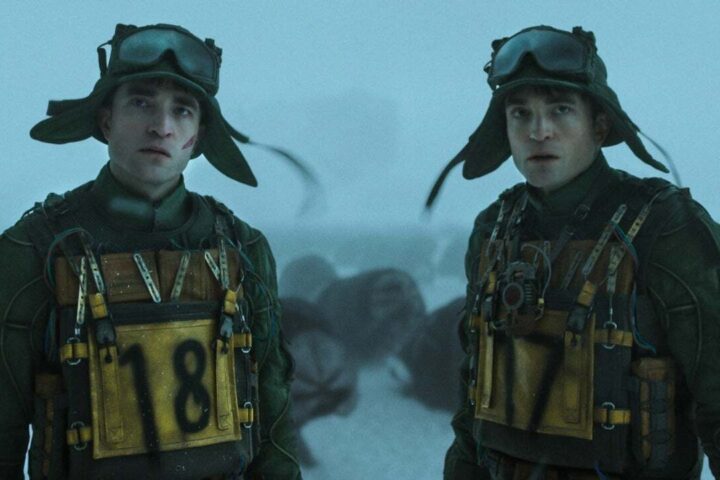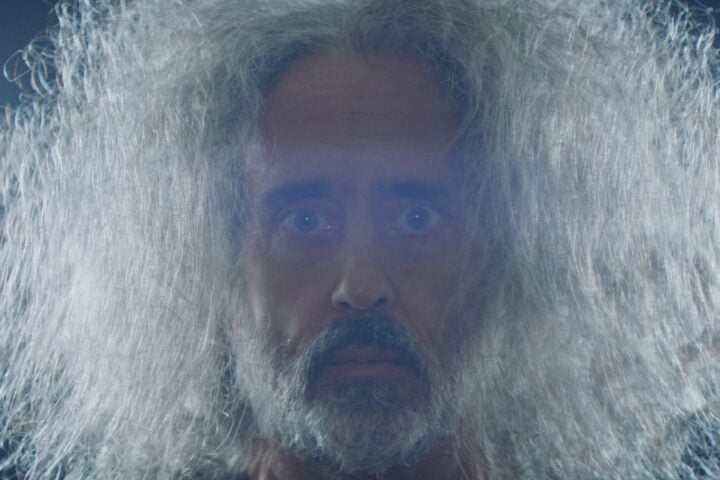As contradictory as it might sound, writer-director Eva Victor’s Sorry, Baby is a wryly, unrelentingly funny movie that happens to be about the shattering after-effects of sexual assault. Victor’s feature-length directorial debut doesn’t use humor to leaven the seriousness of its subject matter, but to ponder its essential power as Agnes (Victor) tries to figure out how life can be so funny and so terrible all at once in the wake of her assault.
We first meet Agnes while she’s reconnecting with her old college roommate, Lydie (Naomi Ackie). They haven’t seen each other in a while, but we can tell right away, thanks to the lived-in authenticity of Victor and Ackie’s performances, that theirs is the sort of relationship that can be picked up where it left off. Watching Agnes and Lydie curled up on the couch, laughing constantly as they swap stories and jokes and knock back glasses of wine, we can feel all the hundreds of other evenings they’ve spent in just the same way.
After this warm and witty introduction, Sorry, Baby jumps back in time to fill in the part of the story that Agnes and Lydie seem to have been purposefully talking around. We know something bad happened to Agnes in college but not what it was, though we can guess its basic shape as soon as we meet Professor Decker (Louis Cancelmi). The good-looking, charming older man singles Agnes out in seminars and lavishes praise on her coursework. Later, this will leave her uncertain of her own abilities, her “extraordinary” essays stained in red by his handwritten notes. When he invites her over to his house one evening to go over her latest paper, we don’t need the film to show us what happens once she walks through the door.
So it doesn’t. The camera lingers outside the building, watching the afternoon light fade as the hours pass before Agnes reemerges. We follow Agnes as she walks back to her car and then drives home, gazing out through the windscreen with a fugue-like expression on her face that suggests there’s a lot more than a thin pane of glass between her and the outside world. Quietly devastating, the sequence forces us to sit with Eva as she ponders how she will go on living in the immediate aftermath of an assault. Through it all, the seconds continue to pass just as they had before, the whole world ticking over as if something earth-shattering hadn’t just occurred.
When she gets home, Agnes talks Lydie through the attack in grim detail, the camera again fixed on her face. She’s still in a kind of daze, trying to parse what exactly happened and what it means. One of the wonders of Victor and Ackie’s performances, as well as the subtle script, is how they allow us to intuit the characters’ thinking. Neither of them are quite able to use words like “rape” or “sexual assault” yet, as if to describe the attack using the vocabulary of, say, news headlines and true crime podcasts would be to accept that she’s entered some kind of parallel world from which she can never return. For them, for now, it’s just “a thing.”
Sorry, Baby lives intently with this sense of dissociation that Anges feels as she struggles to reconcile what’s happened to her with what the rest of her life will be. And it rather brilliantly keys us to the unsettling paradox in her ordeal. Agnes will be fine, and her life will go on exactly as it did before. Agnes is a complete wreck, and nothing will ever be the same again.
It feels like, after we’ve reached this point in Agnes’s story, nothing could ever be funny again either. No doubt that’s how life feels for the character too. And yet, Sorry, Baby somehow manages to mine so much humor from the absurdities that Agnes faces from there on out, and without ever downplaying the severity of what happened to her.
At one point, Agnes is questioned by a robotically unsympathetic doctor, and then by an apologetic pair of college administrators who offer sympathetic faces and feminist slogans while calmly explaining that they won’t actually be doing anything at all about the predator whose path they put her in. Everywhere Agnes turns she’s met with a litany of preordained questions, and hits the brick wall of bureaucracy. It’s absurd that she has to keep retelling these immensely intimate, awful things in such cold, disinterested settings. It’s absurd that everyone agrees that something terrible has happened to her, yet no one seems to want to do anything about it. It’s all so totally absurd that this sharp and observant film can’t help but find it kind of funny.
Since 2001, we've brought you uncompromising, candid takes on the world of film, music, television, video games, theater, and more. Independently owned and operated publications like Slant have been hit hard in recent years, but we’re committed to keeping our content free and accessible—meaning no paywalls or fees.
If you like what we do, please consider subscribing to our Patreon or making a donation.






